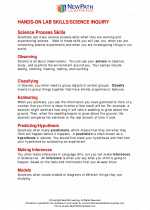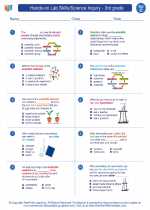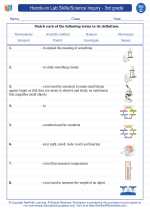Pathology
Pathology is the study of diseases and the changes they cause in the structure and function of the body. It involves the examination of organs, tissues, and bodily fluids to understand the causes and effects of diseases.
Types of Pathology
- Anatomical Pathology: Involves the examination of tissues and organs to diagnose diseases through techniques such as biopsies and autopsies.
- Clinical Pathology: Focuses on the analysis of bodily fluids such as blood and urine to diagnose diseases and monitor treatment.
- Forensic Pathology: Investigates the cause of death in cases of criminal or suspicious circumstances.
Understanding Disease Processes
Pathologists study the cellular and molecular changes that occur in diseases, including inflammation, infection, and cancer. They also investigate the body's responses to these diseases, and how they affect different organs and systems.
Study Guide
Here are some key concepts to understand in pathology:
- Classification of diseases (infectious, genetic, autoimmune, neoplastic, etc.)
- Understanding the cellular and molecular changes in diseases
- Diagnostic techniques in pathology (biopsies, cytology, blood tests)
- Role of pathology in treatment and management of diseases
- Impact of diseases on different organs and systems
Pathology is an important field in understanding and treating diseases, and its principles are essential for medical professionals in various specialties.
.◂Science Worksheets and Study Guides Third Grade. Hands-on Lab Skills/Science Inquiry - 3rd grade
Study Guide Hands-on Lab Skills/Science Inquiry - 3rd grade
Hands-on Lab Skills/Science Inquiry - 3rd grade  Worksheet/Answer key
Worksheet/Answer key Hands-on Lab Skills/Science Inquiry - 3rd grade
Hands-on Lab Skills/Science Inquiry - 3rd grade  Worksheet/Answer key
Worksheet/Answer key Hands-on Lab Skills/Science Inquiry - 3rd grade
Hands-on Lab Skills/Science Inquiry - 3rd grade  Worksheet/Answer key
Worksheet/Answer key Hands-on Lab Skills/Science Inquiry - 3rd grade
Hands-on Lab Skills/Science Inquiry - 3rd grade  Worksheet/Answer key
Worksheet/Answer key O-W-L
O-W-L  Vocabulary/Answer key
Vocabulary/Answer key Hands-on Lab Skills/Science Inquiry - 3rd grade
Hands-on Lab Skills/Science Inquiry - 3rd grade  Vocabulary/Answer key
Vocabulary/Answer key Hands-on Lab Skills/Science Inquiry - 3rd grade
Hands-on Lab Skills/Science Inquiry - 3rd grade 

 Worksheet/Answer key
Worksheet/Answer key
 Worksheet/Answer key
Worksheet/Answer key
 Worksheet/Answer key
Worksheet/Answer key
 Worksheet/Answer key
Worksheet/Answer key
 Vocabulary/Answer key
Vocabulary/Answer key
 Vocabulary/Answer key
Vocabulary/Answer key

The resources above cover the following skills:
Science as Inquiry and Process: A student should understand and be able to apply the processes and applications of scientific inquiry. A student who meets the content standard should:
Develop an understanding of the processes of science used to investigate problems, design and conduct repeatable scientific investigations, and defend scientific arguments.